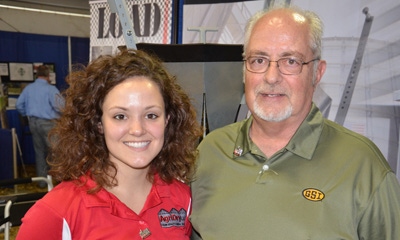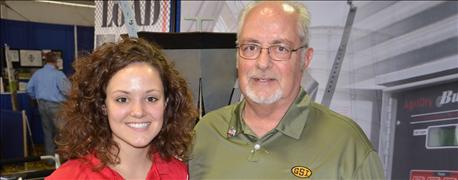
A pioneer is sometimes defined as someone who charts a path through the wilderness. Or it’s someone who is constantly on the cutting edge, perhaps ahead of his or her time. Eli Troyer, Edon, Ohio, qualifies on both counts.
Troyer was one of the early inventors of automatic aeration controllers for grain bins. When Indiana Prairie Farmer first caught up with him more than 25 years ago, he was one of only a handful of people attempting to improve grain quality by automatically controlling grain aeration. The concept was slow to catch on because farmers didn’t even know they needed to worry about grain aeration, let alone understand why they should spend money on a product to do it for them.

FATHER-DAUGHTER TEAM: Eli Troyer and his daughter, Jenni Troyer-Krill, operate a company that provides equipment to help farmers manage stored grain more efficiently.
He’s traveled a rocky road, but Troyer has persevered, as true pioneers do. The company he founded and operates with his daughter, Jenni Troyer-Krill, AgriDry LLC, is now a division of GSI, owned by Agco. Troyer sat down with Indiana Prairie Farmer at the Farm Progress Show to answer some questions.
IPF: What has been your primary goal from the beginning?
Troyer: For nearly 40 years I’ve tried to work on ways to keep grain in better condition in the bin. The line of products we’ve developed helps do that. As technology advanced, we added more products to our lineup.
IPF: What are the keys to keeping grain in condition?
Troyer: I believe there are four keys. First, you must control the temperature of the grain in the bin. Second, spread the fines evenly across the grain mass, and control the temperature of the entire grain mass, including the fines. Third, put quality grain into the bin in the first place. Fourth, monitor the grain in the bin. You need to monitor temperature and moisture. Temperature is so important because if not controlled properly, it can lead to condensation, which can be the start of storage issues.
IPF: You don’t think it’s necessary to core a bin to remove fines?
Troyer: If you use a grain spreader that distributes the grain evenly when it enters the top of the bin, fines are distributed throughout, as well. They don’t wind up in the center, blocking airflow. So, no, if you use a spreader, you don’t need to pull out truckloads to pull down the core of grain in the bin.
IPF: How does maintaining grain quality relate to safety?
Troyer: One of the biggest causes of entrapment and accidents around grain bins is spoiled grain. The idea is to manage the grain so you don’t physically have to go in the bin any more than is absolutely necessary.
IPF: Is the idea of managing grain and using automatic aeration controllers finally catching on?
Troyer: Yes. Five years ago I had one employee: me. The business mushroomed until we had 48 employees. Then $3 corn came along and changed the picture.
IPF: Why did you sell your company to GSI?
Troyer: It allows us to expand our marketing reach and serve more customers. We now have 26 people, who are Agco employees.
IPF: Is maintaining quality as important with $3 corn as it was before?
Troyer: Absolutely. It’s still important to maintain the quality of the grain you’re selling.
About the Author(s)
You May Also Like




